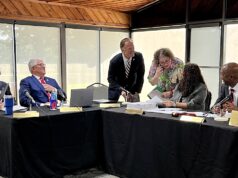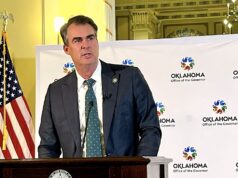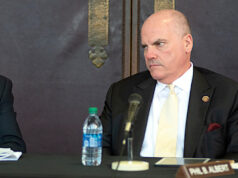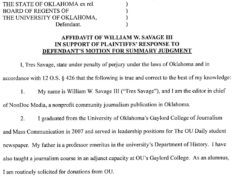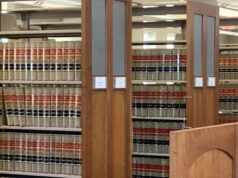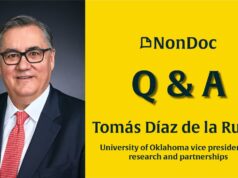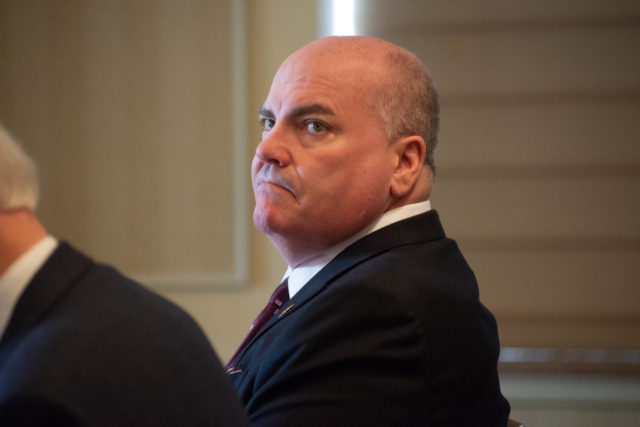

Phil Albert, the former University of Oklahoma regent and former Tulsa Regional Chamber chairman who once was a top political donor in the state, pleaded guilty today in federal court to evading more than $1 million in income taxes.
A former president and managing member at Pelco Structural, Albert admitted to not paying an estimated $1 million in federal taxes from 2014 to 2019. He will be sentenced at a later date.
A tax evasion conviction carries no minimum prison term, a maximum term of five years and a fine of not more than $100,000.
In addition to a possible fine, the 63-year-old Albert has been ordered to pay $1,000,232 in restitution to the IRS and $2,615,750 in restitution to Pelco, according to court documents filed in U.S. District Court for Northern Oklahoma in Tulsa.
From 2014 to 2019, Albert was president of Pelco Structural LLC in Claremore and directed its outside payroll service company to pay him over $2.6 million, according to court documents. Albert instructed that the payments be classified as reimbursements rather than income, so that federal income taxes would not be withheld and the payments would not be reported on his Forms W-2 as wages.
Albert filed individual income tax returns for 2014 through 2019 that did not report the payments, totaling $2,615,750, thus causing a tax loss to the IRS of $1,000,232.
Albert signed his plea agreement Jan. 12, even though the formal charge was filed Jan. 23, according to federal court documents.
“During that time, at my direction, I had the company’s outside payroll service company issue purported ‘reimbursement’ payments to me, via checks, that were structured so that they would so they would neither have federal income taxes withheld nor appear on my Forms W-2,” Albert wrote. “I did not submit receipts or any documentation to support the alleged ‘reimbursements,’ but instead, I would tell the company’s Controller, Don Eagleton whatever amount I wanted, including on at least one occasion giving him a scrap piece of paper with the amount.
“In fact, I knew that the checks did not relate to any legitimate business expense I had made on behalf of Pelco Structural and for which I could have legitimately expected reimbursement. I then deposited the checks into my personal checking account at BankFirst Bank in Claremore, Oklahoma.”
A federal district court judge will determine the sentence and final restitution amounts after considering the U.S. Sentencing Guidelines and other statutory factors.
“I voluntarily and intentionally took these actions knowing that they were illegal and wrong,” Albert wrote above his signature on the plea agreement.
The criminal investigation unit of the IRS and the FBI are investigating the case.
Trial attorney Meredith Havekost of the Justice Department’s tax division and Assistant U.S. Attorneys Richard Cella and Thomas Duncombe of the Northern District of Oklahoma are prosecuting the case.
Albert was accused of tax evasion by preparing and signing a false and fraudulent income tax return for the 2016 calendar year. The specific criminal charge is but one of several illegal and unethical financial actions Albert has been accused of by former Pelco Structural owners and the company’s former comptroller, Don Eagleton.
After being charged, Albert was released on a personal recognizance bond. In return, he agreed to surrender his passport and to not transfer, sell, give away or otherwise convey any asset, without first consulting with the U.S. Probation Office.
In 2022, federal prosecutors reached a plea agreement with Don Eagleton Jr., a former Pelco accountant and controller. According to his sworn plea agreement filed in federal court, Eagleton said Albert “engaged in a scheme and artifice to defraud Pelco Structural and its owners by embezzling” at least $1.5 million between 2016 and 2019.
More background on Phil Albert allegations
In his federal plea agreement, Eagleton wrote that Albert, while he was president and managing member at Pelco Structural, would “write on a scrap piece of paper whatever amount he wanted me to submit as a special reimbursement for him” through the Claremore-based company’s payroll system.
“At Albert’s direction, these reimbursement payments were structured so that they would neither have federal income taxes withheld, nor appear on Albert’s Form W-2,” Eagleton wrote. “At Albert’s direction, I affirmatively concealed the unauthorized payments by falsely miscoding the payments in Pelco Structural’s accounting system so that they would appear within the Cost of Sales-Steel account.”
RELATED
As embezzlement allegation looms, Phil Albert resigns from OU Board of Regents by Tres Savage
Albert resigned from Pelco Structural in April 2019, ultimately filing a preemptive lawsuit against the company he co-founded with Phil Parduhn in 2005. Parduhn’s sons countersued, alleging Albert had embezzled at least $7.4 million. Federal investigators visited and interviewed longtime Pelco Structural employees in February 2022, sources told NonDoc.
Appointed to the OU Board of Regents in 2016 by then-Gov. Mary Fallin, Albert served for a period on the board’s finance committee and stood in line to become chairman for the seventh and final year of his term. Instead, he resigned in January 2022 after declining to comment on the allegations against him for two years.
Phil Albert became a leading political donor
During his time at Pelco, Albert became a civic leader in Claremore and served as chairman of the Tulsa Regional Chamber of Commerce in 2017. He was profiled and lauded for his work in growing Pelco’s statewide footprint. Pelco Structural manufactures large steel poles for commercial, utility, and athletic stadium use.
Albert was one of the state’s most prolific donors to political campaigns. According to records from the Oklahoma Ethics Commission, Albert donated more than $105,000 to candidates and committees from Jan. 1, 2014, through Dec. 31, 2018.
For comparison, Albert donated more money to politicians during that period than other prominent political donors, such as attorney Bob Burke ($88,600), attorney Richard Bell ($76,300), banker Gene Rainbolt ($65,500), businessman Brad Naifeh ($47,694.63), oil executive Larry Nichols ($47,400) and oil executive Harold Hamm ($23,600).
Only donors such as banker George Kaiser ($189,350), QuikTrip founder Burt Holmes ($171,400) and apartment magnate and State Regent Emeritus Jay Helm ($158,700) contributed more cash to political candidates from 2014 through 2018.
Read the 21-page Phil Albert plea agreement
